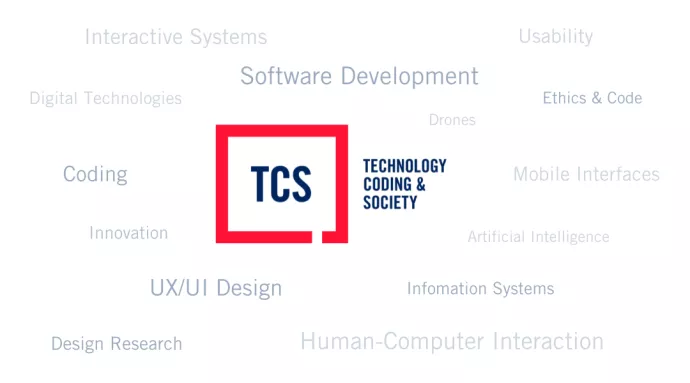
Technology, Coding & Society (TCS) graduates will meet the needs of the rapidly changing society and workforce that are brought on by the emergence of new interactive technologies and by the societal and economic consequences of using these technologies. Students learn essential computer coding skills while understanding the ethics and consequences for people and society, are taught theories on the use of digital platforms from humanistic and social science perspectives, learn to analyze the data that digital platforms produce, and then apply these concepts through practical labs and through optional work-integrated learning opportunities.
One of the few programs in Canada to merge Social Informatics, Computational Social Science and Digital Humanities, TCS graduates will unlock the potential of digital technologies through an appreciation of the points of intersection between technology and the complex human systems that drive it.
Program of study (POSt)
- Major Program ERMAJ1040 Technology, Coding & Society (Arts)
Contents
Course sneak peek
Learn about the core principles of UX analysis and design, as well as software skills related to prototyping and UI design. Incorporated into this all is a deep investigation of how to consider the human user, communities they live in, and values they hold.
In CCT111H5 Critical Coding, understand the foundations needed for the practical coding of front-end applications such as mobile interfaces or of back-end software such as introductory artificial intelligence or social media analysis. Apply these theoretical skills to solving programs in the interaction between people, culture, and society, by developing software or apps in languages such as Java, Objective C, Swift and Python.
Examine Human-Computer Interaction in the context of intelligent interface designs, user modeling and the accessibility of the technology for the disabled in CCT380H5 Human-Computer Interaction and Communication.
Learn how information systems can be designed to respect our rights, and avoid further perpetuating human biases in CCT432H5 Ethics and Code.
Take CCT477H5 UX Design – Understanding Users to learn about the key methodologies for practicing user experience design. You’ll be equipped for your career by finding out about the connections between human factors, user needs, and interactive technologies.
Explore the methods of User Experience Assessment and User Experience Analysis (UXA) in CCT478H5 UX Design – Prototyping and Evaluation where you will examine how interactive systems are implemented and deployed to meet users’ needs.
View the Academic Calendar for a full listing of ICCIT courses and their descriptions.
Skills developed in TCS
- Communication & interpersonal: editing skills; inter-cultural communication skills; create entertaining and persuasive messages; and demonstrate creativity and artistic expression.
- Research: gather information and data; evaluate ideas and research; and conduct research on IT.
- Problem-solving & critical thinking: critical analysis of media; evaluate information and sources; and application of theoretical knowledge in practical settings.
- Technical: create multimedia documents; compare works of media art; create powerful images with sight, sound, motion & words; graphic prototyping; production skills for photography; and design websites and other media forms.
Prospective careers
The career you choose will depend on your experience and interests. Visit the Career Centre to explore your career options.
- Career for graduates: UI/UX designer; UX researcher; Usability analyst; Content strategist; Data analyst.
- Workplaces: Microsoft, Amazon; BMO; Clio; Scotiabank; TD Bank; Ubisoft; Indigo; Zynga; Deloitte.
Program plan
Make the most of your time at UTM and the many opportunities available for TCS students by exploring the TCS Program Plan.
The Program Plan was developed in collaboration with the UTM Career Centre and ICCIT.
Admissions
- Admission to the University of Toronto Mississauga (UTM)
- All program areas require an Ontario Secondary School Diploma, or equivalent, with six Grade 12 U/M courses, or equivalent, including English. The admission average is calculated with English plus the next best five courses. The approximate average required for admission is mid- to high-70s.
- Visit the TCS Admissions page to learn more about studying at UTM, the admission process and requirements.
- Admission to ICCIT programs for current UTM students
- All ICCIT programs (CCIT, DEM, PWC and TCS) are considered “Type 3” subject post and limited enrolment.
- When choosing programs, all students, including transfer students, must meet the program-entry requirements as outlined in the Academic Calendar.
- For more information on choosing programs, how to apply for subject POSt and timelines, visit the Office of the Registrar’s Program Selection webpage.
Contact
- Connect with Truc Tran (she/her), ICCIT Undergraduate Program Coordinator via email at iccit.advising@utoronto.ca
